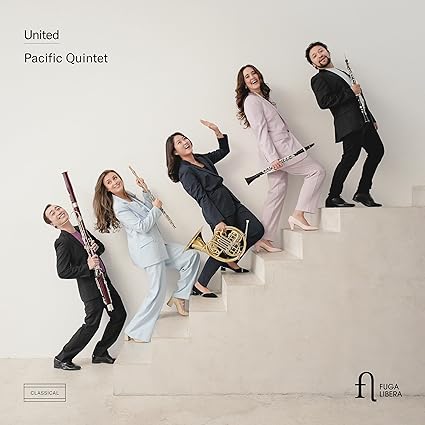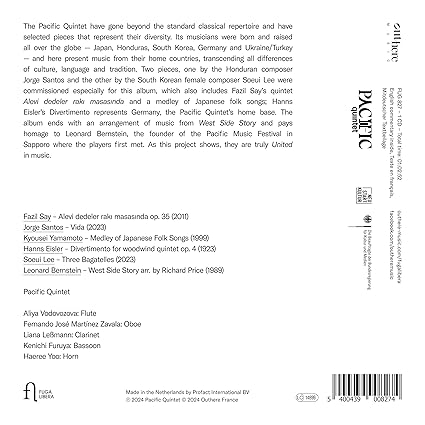But grumbles aside, the music is interesting and varied, and the playing and recorded sound are absolutely spectacular.
Fazil Say (Turkey) is a composer I appreciate more and more with my every encounter with his music. He’s a seriously good piano player too, but so eccentric and flamboyant at the keyboard (with ridiculous vocalizations while he plays), I don’t collect many of his recordings. But he’s a truly gifted and imaginative composer and this opening work fully demonstrates it.
As to these compositions from 6 different countries, the booklet continues to frustrate with its lack of useful information. There are no translations of titles or movement labels anywhere to be found. Google can assist in some instances, but I couldn’t get it to identify any of the Japanese or Turkish words. Thus I have no idea what the title of Say’s work means. Relying only on the brief summary provided in the booklet, we’re told it depicts a day in the life of 5 old Turkish men. Interestingly, the piece has only 4 movements, so I’m still a bit puzzled by what’s going on. So I will concentrate solely on the music itself – and this piece is an absolute knockout! And the perfect concert opener to showcase the capabilities of this group. It is highly virtuosic and expertly scored for this specific combination of instruments.
And indeed, the playing is simply amazing (and I don’t use that word often). The music sounds to be incredibly difficult to play – including rapid, repeated articulation (staccato double-tonguing), dizzying trills, sharp stabbing low notes from the bassoon and horn – all made to sound absolutely effortless in their execution of it. In addition, there is gorgeous tone – colorful and expressive – from all 5 players, along with an extraordinary dynamic range. And I’m hearing all of this just in the opening fantastic presto!
All of these characteristics extend into the Moderato, while the Andantino calls for expressive lyricism, where we hear gorgeous, vibrant flute tone and a robust, golden-hued horn (which never overpowers the others). The closing Presto returns us to the extreme bravura of the opening movement, beginning with incredible pianissimo filigree alternating between the flute and clarinet – again sounding completely effortless, yet menacing at the same time. And later on, incredibly the same gossamer flourishes are assigned to the bassoon and horn, back and forth, played just as effortlessly.
I have to admit I was astounded by what I heard. Not only the music, but especially by the playing. The remainder of the program never quite rose to this exalted level of compositional or musical achievement. However, there is a lot of interesting and rewarding music.
Especially Vida by Jorge Santos (Honduras). After a rather strange introduction, it is followed by 6 short, characterful sections which depict “human life in 10 minutes”. Each is descriptive of its given subtitle (as translated by Google): curiosity, imagination, puppets, wandering, “busqueda” (searching, I believe?), and fullness (of life?). The music is endlessly varied and interesting, and I found the work captivating and over much too soon.
The “Medley of Japanese Folk Songs” by Kyousei Yamamoto (Japan) is another delightful work, obviously based on folk songs. Its 4 movements are very short and to the point: 1) a jig-like dance; 2) a song; 3) playful – charming and delightful; and 4) songful and reflective. I found it very entertaining, and like Vida, simply too short. I wanted more from both of these wonderful composers!
Now things get a little more serious with the Divertimento for woodwind quintet by Hanns Eisler (Germany). This was composed 20 years before his more familiar Nonetto #2, and 90-100 years before almost everything else on this CD. And yet it sounds by far the most “modern”. This was written during his 12-tone phase while a student of Arnold Schoenberg – and it sounds like it. Fortunately he grew out of it quickly and eventually began composing film music, during which time he wrote his two Nonettos, which are decidedly more melodious and tuneful. This Divertimento is not nearly as appealing, but agreeable enough if you like Schoenberg.
Jumping ahead exactly 100 years, musical satisfaction improves with the Three Bagatelles by Soeui Lee (South Korea). Each is delightfully contrasting, beginning with some charming music for a marching band. It incorporates some unusual techniques such as subtle flutter-tonguing, and features the horn prominently. And what a fabulous player Haeree Yoo is! This is followed by a lyrical Serenade propelled forward by a delightfully bouncing bassoon. And the piece concludes with a Korean Dance, featuring traditional Korean rhythms.
If not quite as musically rewarding as the first three works on the program, it is nonetheless enjoyable and over too quickly.
To close the concert, I was disheartened the group chose to represent the United States with yet another frivolous, superfluous arrangement of 3 hit tunes from Bernstein’s West Side Story. If the U.S. had to be represented at all, why not choose another original work for woodwind quintet? After a program of fascinating, wonderful original works for woodwind quintet, I wasn’t at all interested in hearing them play a merry arrangement of I Feel Pretty. I’m sure it provides a stirring encore for those who are so inclined to listen to it, which I was not.
The production itself is very fine, including charming pictures of the musicians on an attractive trifold cardboard enclosure. The rather inadequate booklet, though, is disappointing. I would have expected to read something – at least a brief bio – about this ensemble on this, its debut album. And given most of the program is comprised of new music from composers likely unknown to most of us, I expected more thorough program notes too. I did read on the back cover that 2 of the works were commissioned for this album and we can presume these are premier recordings. Fortunately, the recorded sound is superb and the playing of this group is jaw-droppingly awesome.
I love a highly accomplished woodwind quintet, especially as there is so much really good music written for the genre. Several outstanding groups have released CDs recently which I have enjoyed enormously – including the Monet Quintett (on Avi/SWR2), Orsino Ensemble (Chandos), and members of Ensemble Arabesques (Farao Classics). The Pacific Quintet can certainly stand proudly among them as one of the very finest. I simply cannot wait for another album from them – or from any of these other groups as well.






.jpg?w=670&resize=670,446&ssl=1)




